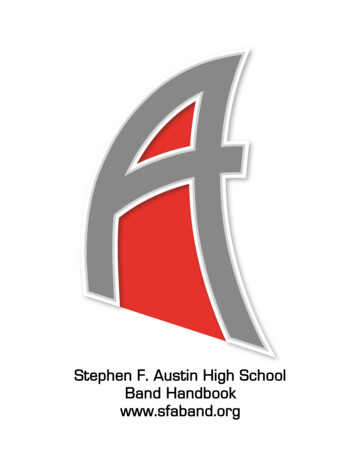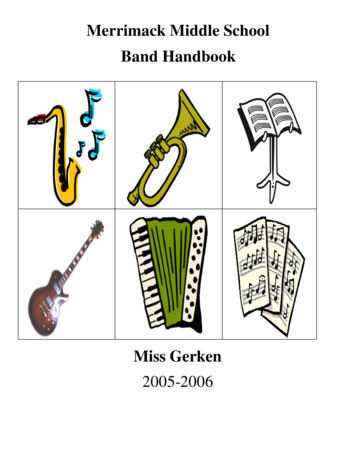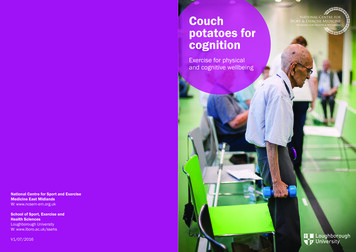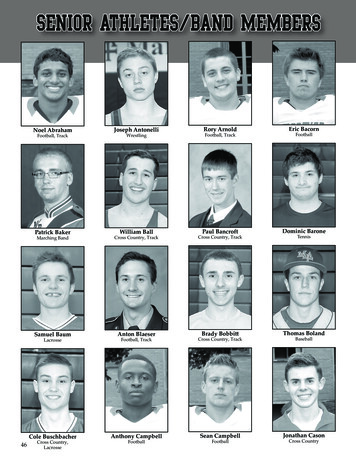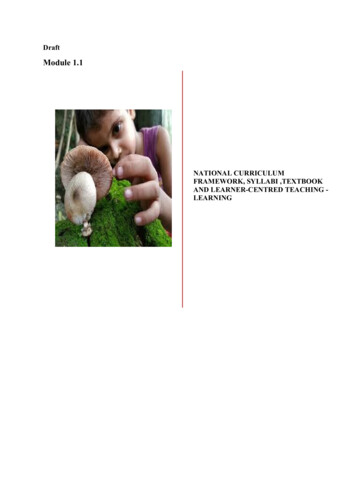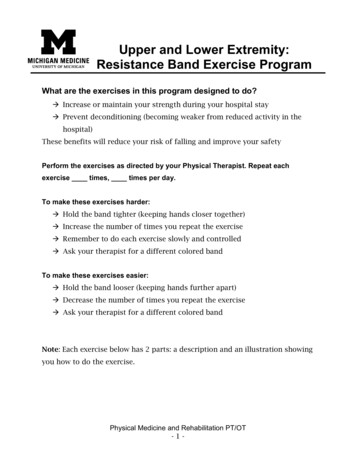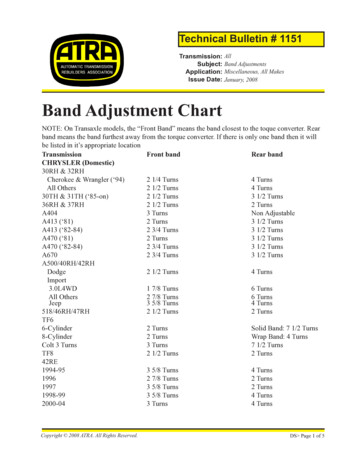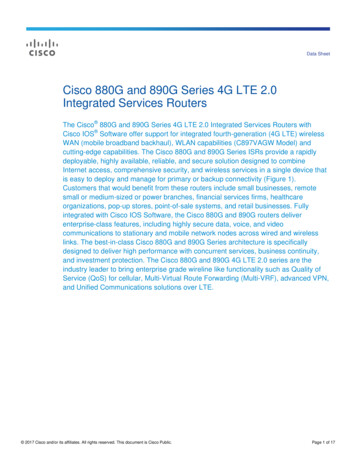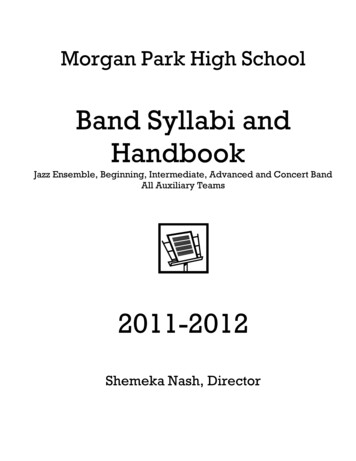
Transcription
Morgan Park High SchoolBand Syllabi andHandbookJazz Ensemble, Beginning, Intermediate, Advanced and Concert BandAll Auxiliary Teams2011-2012Shemeka Nash, Director
Parent Letter. 4Forward . 4Teacher Credentials . 4Program Schedule and Contact Information for Ms. Nash . 5Philosophy. 5Goals . 5Rules and Policies . 5Band Classroom Rules and Procedures . 5RulesConsequences . 5Student IDs. 5Attendance . 5Tardiness and Cuts . 5Electronic Devices . 5Make-up Policy . 6Washroom Procedures . 6Gum Chewing, Drinking Beverages and Food Consumption . 6Band Class Grade Policies and Categories . 6Evaluation Policy . 6Grade Scale . 6Performances . 6Class Participation (Classwork) . 6Tests . 7Final Exam . 7Remediation Policy . 7After-School Ensembles . 7Other Policies . 8Beginning Band Course Information . 8Texts . 8Required Materials . 8Beginning Band Course Map . 9Intermediate/Advanced Band Course Information . 11Texts . 11Required Student Materials . 11Intermediate and Advanced Band Course Map . 11Jazz Band (Ensemble) Course Information . 12Texts . 12Required Materials . 13Jazz Ensemble Curriculum Map . 13Instrument Care and Maintenance . 14School Owned Instruments . 14Recommended Supplies . 15Financial Obligations . 16Band Fees . 16Beginning Band 2011-2012 . 16Jazz Band Fee 2011-2012 . 16Intermediate and Advanced Band (Concert and Marching Band) Fee 2010 – 2011* . 16Students Joining Intermediate and Advanced Band during Semester 2 . 16Uniform Pricing . 17Percussion Bag for Beginning, Intermediate and Advanced Band Students . 17Fundraising . 17Parent Obligations . 17General Performance Policy and Guidelines . 18MPHS Band Handbook2
Performance Philosophy and Guidelines for Athletic Events. 18Transportation Policy . 18Performance Expectations . 19Uniforms and Performance Attire . 19Concert Band . 19Beginning Band . 19Jazz Ensemble . 19Marching Band Uniforms and Attire. 20Marching Band and Nutrition . 20Student Leadership. 20Drum Majors . 20Practice . 22Auxilliary Teams. 23Flags. 23Majestics . 23Majorettes. 23The Role of Auxiliary Coaches . 24Auxiliary Rules and Policies. 24Letter and Award System . 26Calendar of Events . 27Calendar of Events . 27Parent/Guardian Acknowledgment Form . 29MPHS Band Handbook3
Parent LetterDear Parent or Guardian,We are embarking on an exciting new path this year. In January the concert and jazz band are scheduled to travel toNew York, New York to attend the United Nations Headquarters, Statue of Liberty- Ellis Island & Ferry Boat Ride,Rockefeller Center, Empire State Building, Lincoln Center, St. Patrick’s Cathedral, St. Paul’s Chapel, Ground Zero andTime Square. This is a major event which includes a college tour of a New York Area University. Students can arrange allpayments for this trip through the use of fundraisers.I would like to share other information with you in terms of your child’s participation in band. Often people aremisinformed about the benefits of participating in a band program. Since my time at Morgan Park we have had severalcollege band directors auditions our students right here in room 106. Those directors represented Hampton University,the University of Arkansas at Pine Bluff, Central State University and Albany State University. We currently have MorganPark alumni at each of these schools that have earned a partial if not full scholarship to these universities. Also, thesestudents are NOT music majors. They are simply earning extra money for to apply toward their intended major whetherit is engineering or businesses. The odds of a student receiving a partial scholarship to college through participation inband are fairly high. Many universities are looking for students to participate in their programs and will awardscholarships to worthy students.Please keep this in mind as your child grows musically. Encourage them along each step of the way. Senior year isnot the time to hustle and practice to earn extra money for college. It takes endurance and patience to develop skill onan instrument. Scholarship opportunities are available just encourage practice and participation.Sincerely,Shemeka NashDirector of BandsForwardAll students of the MPHS Band Program are given this syllabus/handbook, which contains important information forall members. To clarify information for beginning, intermediate and advanced band students all information has beencompiled into one document, as in many instance policies and procedures are the same for all band courses of study.Parents and students are asked to familiarize themselves completely with the material. Keep this syllabus easilyaccessible for quick reference throughout the year. If there are questions, comments or concerns about this syllabusplease contact Ms. Nash at 773-535-2804 or slnash@cps.eduLastly, all information found within this document can be found on the school website:http://morganparkcps.org Click on Band DepartmentTeacher CredentialsBachelor of Music - Music Education, DePaul UniversityMaster of Music – Music Education, Northwestern UniversityOrff- Schulwerk Level IMPHS Band Handbook4
Program Schedule and Contact Information for Ms. Nash2009-2010 Program Schedule for Ms. NashPeriodTimeInstructor Schedule1st7:45-8:31General Music2nd8:35-9:21Beginning Band3rd9:25-10:114th10:30-11:16General Music5th11:20-12:06Beginning Band6th12:10-12:567th1:00-1:46Jazz Band8th1:50-2:36Intermediate/Advanced BandBand Director: Ms. NashTerm: 2011-2012Band Office Telephone: 773-535-2804Email: slnash@cps.eduRoom106106106106106106Room: 106PhilosophyThe band program seeks to provide quality experiences and opportunities for each of its participants.Goals1. The band program serves to enhance participant’s music education through quality performance.Rules and PoliciesAll policies and rules of the CPS and Morgan Park handbook are applied to every band activity, including rehearsalsbefore and after school, Saturday classes and rehearsals, field trips and off campus performances. All participants areexpected to be familiar with and follow those guidelines.Band Classroom Rules and ProceduresRules1. Follow directions.2. Raise your hand to speak.3. Respect classmates, faculty and visitors.Consequences1. Parent phone call.2. Conference/Assignment.3. Misconduct report.Student IDsAll students must wear IDs in the classroom. Students not wearing IDs must purchase a temporary or permanent IDfrom the Attendance Office.AttendanceThe guidelines governing attendance (both during school and for after-school activities), and the effect it has ongrading, are the same as those outlined in the MPHS students handbook.Students must attend band class everyday because they will receive practical instruction on their instruments, whichis difficult to gain if a class session is missed. Each class follows a sequence of skills, techniques and activities that mustbe completed in a sequential order. The only excused absences for performance grades are unexpected events, suchas personal illness or death in the family.Tardiness and CutsAll policies outlined in the Morgan Park students hand book will be adhered to.Electronic DevicesMPHS Band Handbook5
Students may not use any electronic device (cell phones, music devices, PDAs, etc.) in the classroom. Procedureslisted in the uniform discipline code will be followed accordingly.Make-up PolicyStudents are allowed to make-up written assignments for excused absences only. All absences must be excused.Written assignments are due one day after the student returns to school. Performance assignments cannot be madeup.Washroom ProceduresOnce students enter class they may not leave for the restroom unless appropriate documentation is on file with theschool. Please bring medical passes to class so that the teacher can notate them. Students are encouraged to calculaterestroom time into their schedule in a manner that does not disrupt their class time or make them late for any class.Gum Chewing, Drinking Beverages and Food ConsumptionChewing gum is not allowed in any band class. Similarly, drinking beverages other than water in a clear containerand eating food of any kind is not allowed in band class.Band Class Grade Policies and CategoriesEvaluation PolicyPerformance ReflectionsClassworkTestsMid-term/Semester FinalsBand Portfolio40%30%15%10%5% (You may add this 5% to Classwork ifyou do not have binders/notebooksGrade ScaleA100-90B89-80C79-70D69-60F59-0Please check the IMPACT Parent Portal for frequent grade updates.PerformancesBand is a performance-based class and there will be several required performances during the music year.Beginning Band students are required to complete 1 performance per semester.Intermediate and Advanced Band are required to complete 4 are required to complete 4 performances per quarter.For a complete list of activities please refer to the calendar located on pageClass Participation (Classwork) and HomeworkParticipation is essential to successful experiences in music. This means that students must remain open minded tolistening experiences, singing and playing instruments. Students will receive daily class participation grades based on asample rubric attached to this syllabus. Daily assignments will include and are not limited to singing, playing oninstruments, composing, listening to and analyzing music. All performance-based assignments will be graded informallywith a daily performance rubric.MPHS Band Handbook6
Homework is due during the next day of class. For students that own or rent an instrument 15 minutes of practice isrequired for homework every day. Students are to practice the exercises or excerpts covered during class.The music portfolio must be maintained in the following order:TestsThere will be one brief test every Friday. Each test is aculmination of the information and skills that were developedduring the week. This is a formal assessment graded with a rubric.Music PortfolioStudents are required to keep their music portfolio inthe following order.LeftRightPerformance ReflectionsAll sheet music andRubricsscales must be stored inTests and Quiz Resultsalphabetical order.Final ExamThe final exam is a performance-based comprehensive review.Students will be given guidelines for special projects as the class progresses.Remediation PolicyACTIVITIESACTIVITY #1 TOPIC SUMMARY: (5 points)The student will complete a typed summary of 3-5 paged on a teacher-selected music-related topic. The teacher willprovide a list of topic-specific guiding questions.ACTIVITY #2 MINI-PROJECT: (5 Points)The student will research and create a musical instrument. The student must include a typed a guide identifying thefollowing: materials used to create the instrument; the term used by ethnomusicologists to identify the instrument(chordophone, aerophone, idiophone or membranophone); the instrument family name (string, woodwind, brass orpercussion) and a historical background of the instrument.ACTIVITY #3 COMPOSERS, INSTRUMENTS OR MUSIC HISTORY: (5 Points)The student will complete 8-10 reading and comprehension activities.TUTORINGTutoring is NOT available; however teachers are available by appointment to assist students after school or during thestudent’s lunch period upon request. (based on availability)POOR EXAM GRADESStudents with poor exam grades may take exams in smaller portions OR take a retest.Students may use notes to complete multiple-choice or short answer quizzes or tests upon student request (if stated onIEP).FREQUENCY and DUE DATESRecovery activities will be assigned by the teacher with progress reports and/or at least two weeks prior to the end ofeach quarter.The student will be given a maximum of two weeks to complete Recovery Activities. (Additional time will be allowed forstudents with IEP’s – Check IEP for approximate duration. Teachers will consider providing a glossary for these activities,as needed).After-School EnsemblesAll members must maintain a C average.MPHS Band Handbook7
Students reentering the building after being dismissed for the day by the band director (trespassing) will face severediscipline action as stated in the code of student conduct.Other PoliciesStudent may not make arrangements, announcements, etc. for the band without Ms. Nash’s permission.Students may not set or conduct rehearsals without Ms. Nash’s permission.Students may not order items including section t-shirts, jeans, hats, etc. without permission.Probation will be issued at the discretion of Ms. Nash.Students not registered for band class are not guaranteed awards, positions, or spots in the band.Beginning Band Course InformationCourse Number: #93810Credit: 1-CREDITCourse DescriptionThis class offers a comprehensive approach to music education. Students will have an opportunity to sing, play,compose, conduct, listen and analyze different styles of music.Course ObjectivesStudents will: Perform on instruments a varied repertoire of music. Sing a varied repertoire of music. Improvise melodies, variations, and accompaniments. Compose and arrange music within specific guidelines. Read and notate music. Listen to, analyze and describe music. Evaluate music and music performances. Understand the relationships between music, the other arts, and disciplines outside the arts. Understand music in relation to history and culture.TextsAyola, Edward. (1985). Winning Rhythms. San Diego, CA: Kjos.Lautzanhaiser, T. (1999). Essential Elements 2000. Milwaukee, WI: Hal Leonard Corporation.Pearson, B. (1993). Standard of Excellence. San Diego, CA: Kjos.Required MaterialsAppropriate Mouthpiece and SticksSupplied Sheet MusicTextbooks3 hole loose-leaf paper (Not from a spiral binder)PencilsSupplied FolderMPHS Band Handbook8
Beginning Band Course MapBeginning Band Curriculum MapTimeWeeksTopics,Concepts,Big gustRationale: Tobecomefamiliar withthe languageand basicsymbols ofmusic notation.26.A.4d Music:Demonstrate the ability toread written notation for avocal or instrumental part.Read simple rhythmswithout an instrument inhand.Produce sound onmouthpiece anddevelop embouchure.SeptemberRationale: Todemonstratehow separateelements canbe combinedto form ameaningfulwork of art.26.A.4d Music:Demonstrate the ability toread written notation for avocal or instrumental part.Read simple rhythmswithout an instrument inhand.Produce sound onmouthpiece anddevelop embouchure.Good playing posture,October/NovemberRationale: Toexposestudents to thevariedmediums forperforming amusicalcomposition.26.B.4c Music: Create andperform music ofchallenging complexityand length withexpression.Sight-reading.Basic dynamics.Tempo.Conducting in two,November/DecemberRationale: Toexamine musicof manycultures.27.B.4a Analyze andclassify the distinguishingcharacteristics of historicaland contemporary artworks by style, period .JanuaryRationale: Toanalyze andevaluatestudent andprofessionaltone color andrhythm.25.A.4 Analyze andevaluate the effective useof elements, principlesand expressive qualities inacomposition/performancein dance, drama, musicand visual arts.Sight-reading.Accents.First and secondendings.Conducting in three.MPHS Band HandbookAssessments,Evidence of MasteryStudent FriendlyCan StatementsActivitiesWhat is rhythm andtime?What is sound andhow do we produceit?Weeklyperformance quiz.Dailyperformance ofmethod bookexercises.I can identifybasic symbols ofmusic notation.I can clap andrepeat rhythmsas given by myteacher.Clapping rhythms.Theory exercises.Brass: buzzes and sirens.Woodwind: mouthpiece.Percussion: multi-bounce.Winds: pitch matching.Percussion: Sticking and grips.What ischaracteristic toneon a musicinstrument?How many differentfamilies ofinstruments exist?How are instrumentscategorized intofamilies? (Discussmaterials andmethods of playing.)What is timbre?What are theelements thatcontribute to thevaried timbres of theband instruments?5th week test.Weeklyperformance quiz.Dailyperformance ofmethod bookexercises.I can identify andevaluate:rhythm, melodyand timbre bylistening toexamples.I can identify andcategorizewoodwind, brassand percussioninstruments.Warm-ups.Long tones.Brass: buzzes and sirens.Woodwind: mouthpiece.Percussion: multi-bounce.Winds: pitch matching.Percussion: Sticking and grips.Clapping and countingrhythms.Basic Theory.Method book exercises.10th week test.Weeklyperformance quiz.Dailyperformance ofmethod bookexercises.I can recognizethe differencebetween goodand bad tonequality,I can play atleast 25 differentsymbols formusical notation.Playing on instruments aloneand together.Theory exercises.Student rhythm pieces.Warm-ups.B-Flat penta scale,Method Book Exercises.Winter Concert Repertoire.Why is musicconsidered to be a“universallanguage”?Can musiccommunicate astory, mood, orthought withoutwords?Is music of allcultures organized inthe same manner?What are the majordifferences in thetone color of ex.Wynton Marsalis vs.Jon Faddis?15th week test.Weeklyperformance quiz.Dailyperformance ofmethod bookexercises.I can performeasy band musicon instrument.Theory exercises.Playing on instruments aloneand together.Winter ConcertSemester Final.Weeklyperformance quiz.Dailyperformance ofmethod bookexercises.I can evaluatemy concertperformance.I can identifyareas in myplaying in needof improvement.Playing on instruments aloneand together.Theory exercises.Method book exercises.Warm-ups.Spring Concert Repertoire9
FebruaryRationale: Todemonstratethe ability toread writtennotation for aninstrument.26.A.4d Music:Demonstrate the ability toread written notation for avocal or instrumental part.Sight -reading.Slur.Pick-up.Multiple measure rest.D.C. al Fine.Theme and variations.What instrumentshave the melody?How does my partcontribute to theentire piece?Are my articulationsclear?Weeklyperformance quiz.Daily performanceof method bookexercises.MarchRationale: Toanalyze andevaluate theeffective use ofelements,principles andexpressivequalities in acomposition.Rationale: Toperform grade.5-2 repertoire.To analyzeways in whichmusical soundsare producedand how theyare used incomposing,conductingandperforming.Rationale: Toincorporateunderstandingof rhythm,melody, tonecolor and stagepresencethroughperformance.25.A.4 Analyze andevaluate the effective useof elements, principlesand expressive qualities inacomposition/performancein dance, drama, musicand visual arts.Sight-reading.Common time andrepeat signs.Conducting in four.Intervals.Brass: lip slurs.Woodwind: upperregister.Percussion: Closed roll.Sight-reading.Enharmonic notes.Chromatic scale.B-Flat major scales,chords, and arpeggio.Why is musicconsidered adiscipline? Explain.How manycomponents aresignificant for apolished instrumentalperformance?25th week test.Weeklyperformance quiz.Daily performanceof method bookexercises.What are theelements of aconcertperformance?How can aninstrumentalistenhance a concertperformance?26.B.4c Music: Createand perform music ofchallenging complexityand length on.Tone Color.Tempo and dynamics.What are theelements of aconcertperformance?What must musiciansdue to prepare for aconcertperformance?Rationale: Toanalyze andevaluatestudent andprofessionalworks for howaestheticqualities areused to conveyintent,expressiveideas and/ormeaning.25.A.4 Analyze andevaluate the effective useof elements, principlesand expressive qualities inacomposition/performancein dance, drama, musicand visual arts.Awareness of thevaried nonperformance careeropportunities in themusic industry,How has myknowledge of musicincrease since mystart in September?How has my tonecolor improved sinceJanuary?AprilMayJune26.B.4c Music: Createand perform music ofchallenging complexityand lengt
Morgan Park High School Band Syllabi and Handbook Jazz Ensemble, Beginning, Intermediate, Advanced and Concert Band All Auxiliary Teams 2011-2012

